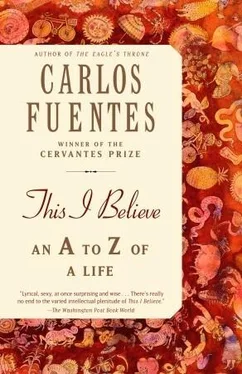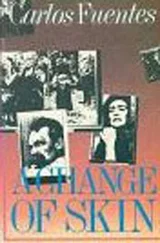The second topic that mesmerized us was World War II. It has been called the only good and necessary war. Of that there is no doubt. Never before has evil emerged in such a horrifying and specific incarnation as that of the Nazi regime. Fighting this evil absolved of all sin any alliance with a “minor” evil— Stalin — but did impose an almost absolute faith in the goodness of liberty, which the Allied struggle represented. The evils of Western capitalism and Soviet totalitarianism were obfuscated by the absolute evil of the Holocaust, the concentration camps, the slavery imposed upon France, Belgium, Holland, Denmark, Norway, the Balkans, Greece. . Even the crimes of the Stalinist purges seemed to have been momentarily erased by the siege of Leningrad and the glory of Stalingrad.
The euphoria of the Allied victory quickly degenerated into the third topic, the long and terrible era of the Cold War. Almost half a century of unyielding Manichaeism — the good guys are here, the bad guys are over there. The total subjection of Central Europe to the Soviet dictatorship. The symmetrical reflection of the intolerance and witch hunts of the McCarthy era in the United States. And if the United States, in the end, finally rose up against “indecent” McCarthyism (as army counsel Joseph Welch called it in the Army-McCarthy hearings, 1954), it nevertheless subjected its backyard neighbor, Latin America, to a repressive, regressive demonization that, marrying U.S. imperialism with Latin American militarism, went against all economic reform and social democracy in the name of anti-Communist paranoia.
The wars of Central America began in Guatemala in 1954, and only ended thanks to the diplomatic efforts of the Contadora Group of peace mediators and the initiatives of Óscar Arias, president of Costa Rica in the 1980s. From John Foster Dulles (“The United States doesn’t have friends, it has interests”) to Ronald Reagan, who claimed that the Sandinistas could make it to Harlingen, Texas, from Managua, Nicaragua, in a matter of two days, Spanish America had to suffer the deaths of 300,00 °Central Americans and the torture, disappearance, and death of thousands of Argentinians, Uruguayans, Chileans, and Brazilians. This is the abominable arithmetic of the Cold War in Latin America, whose wounds have still not entirely healed. The memory of the horrors is alive. I have known Chilean women raped in front of their children and husbands, in the dungeons of that savior of Christianity, Augusto Pinochet. I have known Argentinian mothers who will never again see their children who were “disappeared” by the ruthless military officers operating under the command of Jorge Videla. I have seen the terror that blanches the faces of the men and women of the Southern Cone upon the mere mention of the so-called “Angel of Death,” the winsome blond Captain Astiz whose special predilection was throwing live nuns from airplanes into the River Plate, or of Contreras, the Chilean general who assassinated Orlando Letelier on the streets of Washington, D.C., in 1976, Carlos Prats on the streets of Buenos Aires in 1974, and Bernardo Leighton on the streets of Rome. Ariel Dorfman bears full testimony to the truth in his dramatic work Death and the Maiden. In the jail cells of the DINA in Santiago de Chile, the dictator’s thugs entertained themselves by inserting live rats into the vaginas of their female prisoners.
The shortest century, from Sarajevo, 1914, to Sarajevo, 1994. How very long, in comparison, the nineteenth century seems, stretching from the French Revolution all the way to the First World War. How long it was in cultural terms, as well — in literature it went from Goethe through to Joyce; in painting, from Ingres and Delacroix to Matisse and Braque; in philosophy, from Schopenhauer and Kant to Husserl and Heidegger. And how very short was the century that began and ended with Picasso.
The last topic of the twentieth century extends into the twenty-first, and it is called globalization. Having lived through the four eras, I can now state that globalization is the name of a power system. Just like the Holy Spirit, it has no boundaries. Just like Mount Everest, it is there. And just like the Law of Gravity, its evidence is irrefutable. But like the Latin god Janus, it has two faces. The good face is that of technical and scientific progress— the most rapid in all of history. Free trade, the postulate of economic freedom since the days of the Prussian Zollverein that set the stage for the unification of Germany. Productive offshore investments. The accessibility to and dissemination of information that leaves many emperors, who once covered themselves with the vine leaves of the Asian, African, and Latin American jungles, with no clothes. The universalization of the concept of human rights and the invalidity of statutes of limitations for crimes against humanity such as those of Pinochet, the Chilean murderer and torturer, the source of all criminal order during his dictatorship.
But Janus has another, less attractive, side. The sheer speed of technological progress leaves behind — perhaps forever — those countries that are unable to keep up with the pace. Free trade increases the advantages to be gained by massive, competitive corporations (which are very few) and crushes small and medium-sized industry without which the employment, salary, and welfare levels of the great mass of people suffer, hindering support for the development of the Third World. As a consequence of this, globalization only widens the gap between rich and poor, both internationally and within each nation: 20 percent of the world consumes 90 percent of world production. And what begins to emerge is the specter of a kind of global Darwinism, as Óscar Arias called it. Speculative investments prevail over productive investments: 80 percent of the 6 billion dollars that circulate daily in the world markets is speculation capital. The crises of globalization, for this reason, are not business or information or technological crises: they are crises of the international financial system, brought on by the loss of social control over the economy and the weakening of political power in the face of cresohedonic power.
In this union of Croesus (money) and Hedone (pleasure) global culture becomes a fashion show, a giant screen, a stereophonic boom, an existence made of glossy, four-color paper. It transforms us into what C. Wright Mills called “cheerful robots,” and it condemns us, as the title of Neil Postman’s celebrated book goes, to “amusing ourselves to death.” In the meantime, millions of human beings die without having smiled once in their entire lives. A massive transfer from rural to urban life will, in the twenty-first century, bring about the eradication of one of the oldest forms of life, the agrarian life. All we will have is city life. And the widespread crises of urban civilization that go with its uncontrollable pandemics, homeless people, crumbling infrastructures, discrimination against sexual minorities, women, and immigrants. Begging in the streets. Crime.
Are there any answers to this crisis? What role is to be played in the twenty-first century by the left-wing ideology in which I was educated, whose ideals I assimilated, whose crises I witnessed and criticized? Can the political world resume control over the anarchy of the markets? Does the state have a role in the globalized world? There are. It can. It does. The Friedmanite antistate discourse of the Reagan-Thatcher years proved itself to be hypocritical and insufficient in time. The state, though declared obsolete, was certainly strong enough to save insolvent banks and fraudulent financiers and to coddle arms industries. In 2001 we realized that there is no such thing as a stable democracy without stable government. Far from reducing the role of the state, globalization has in fact broadened the areas that fall under public jurisdiction. What has been reduced is the proprietary state. And what is most necessary is a state that can regulate and establish standards. There is no developed nation in the world where this is not the case. And it is even more important in countries of weak economic agents, such as Latin America.
Читать дальше












